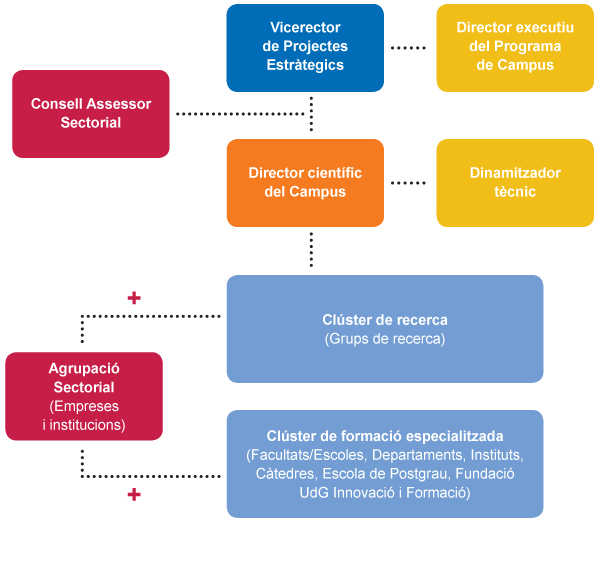
The academic management of a sectoral campus is the responsibility of the Scientific Director, who is a prestigious academic at the University in its areas of action and whose main missions are direct, effective dialogue with the external stakeholders and the efficient coordination of the internal stakeholders and the University’s resources, contributing vision, knowledge and leadership.
The day-to-day running of the campus is the responsibility of the Campus Facilitator, a member of the administrative and service staff, reporting operationally to the scientific director.Their responsibilities include the development of all the activities entrusted to the campus, from maintaining networking with the sector and the research groups to organising events and coordinating the working groups and internal clusters, etc.
A cornerstone in the campus's structure is the Sectoral Advisory Council (CASE), which is made up of a small group of people chosen for their professional and personal backgrounds, all external to the university, whose authority is indisputably recognised in the sector.The persons who shape the CASE are there in a personal capacity and not in representation of companies and institutions to which they belong.The - CASE becomes an A forum of debate that has to bring independent strategic vision, not influenced by the conditions that affect the UdG, and that has to orientate the approach of the academic activity of the campus regarding the orientation and needs of the research as well as on the subject of education.He has to advise also about the model of relation with the companies of the sector and the international presence of the campus and give support to the institutional relations related with the campus, in the measure of the possible one.
Internally, the university will organise its resources based on two structures: the so-called research cluster and the specialised education cluster.
It Cluster of Research it is the group of all groups of research that bring the knowledge and the expertise in the area of the Campus, and that have manifested the interest of taking part actively in its definition and strategic planning.
In a parallel way, the Cluster of Specialised Education concentrate the structural units (teaching institutions, departments, institutes, chairs and foundations) that develop academic and formative activities related with the subject matters of the campus or those other ones that, for its orientation, can be there interested.This cluster has for mission the strategic definition of the specialised education, to coordinate contents and to ensure the quality of the teaching that derives from it.
Finally, as for the sector, all companies and institutions registered with the sectoral campus make up the Sectoral Group. Each of the companies and institutions correlates with the campus in accordance with one of the modalities that the “programme of tie with the companies and institutions”, in which the conditions of participation in the campus and the benefits that this offers him are stipulated, establishes.Note that the Sectoral Group, which consists of companies and institutions, should not be confused with the Sectoral Advisory Council, which is made up of prestigious individuals in the sector.
All the Sectoral Campuses are run by the Vice-Rector for Strategic Projects, assisted by the executive director of the Sectoral Campus Programme, a task carried out by the Head of the UdG’s Planning and Assessment Office.